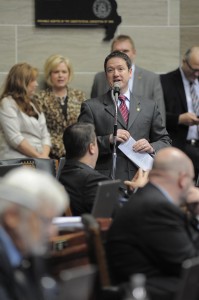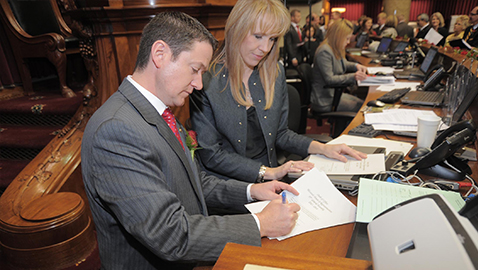By Eli Yokley
JEFFERSON CITY, Mo. — A calm before the storm has fallen on Jefferson City as lawmakers and staff members are home in their districts for legislative spring break.

The halls of the Capitol are mostly empty, the streets are less congested, and one is likely to see mostly locals when hitting-up a favorite downtown restaurant. But when the General Assembly returns next week, the pace of things will speed up significantly as the logjam of bills stuck in committees move forward and debate about the budget moves into full swing.
House Speaker Tim Jones, R-Eureka, fresh off the first half of his first session as leader of the lower chamber, said the House will move on five priorities, aside from the budget, when they return next week, including movement on legislation to roll back the Second Injury Fund (which he hopes to perfect this year), medical malpractice reform, teacher accountability and “moderate tenure reform,” pro-gun legislation, and tax policy reform.
In a mid-session interview with The Missouri Times, Jones said he has been “pleasantly surprised” at how he has been able to work with Senate leadership. Jones said he and Senate President Pro Tem Tom Dempsey have almost weekly meetings where they discuss pending legislation and their legislative strategies.
“We have different ways and strategies, but I’ve been really happy with the working relationship with the House and Senate,” he said.
Despite their cordial relationship, Jones did not hide the fact that he has some disagreements with the upper chamber. Chief among them, he said, was the Senate’s decision to move forward two ideologically conflicting pieces of tax legislation — one that would raise sales taxes by nearly $8 billion for transportation, and another that would cut income taxes and raise the state’s sales tax.
“It is an issue where Republicans in the GA have a disagreement on in total,” Jones said of the transportation bill, sponsored by Sen. Mike Kehoe, R-Jefferson City. “We just had an election five months ago and Missourians rejected a tax increase on cigarettes. If they’re going to reject that kind of tax increase, I don’t know why they would agree on the largest ever tax increase in the state.”
More plainly, Jones stated: “An $8 billion tax increase will not sail in my caucus.”
Jones said he would be more favorable of the legislation sponsored by Sen. John Lamping, R-St. Louis, which would dedicate some funding to transportation from an increased sales tax. While it would not reach Kehoe’s funding level, Jones said it would be more realistic for his caucus to support, as members cling to their ideological bend against tax increases.
During the first two months, both chambers showed interest in labor legislation. Just last week, the House and Senate passed their own versions of legislation that would disallow union dues from being used for political purposes. The Senate’s bill requires employees to approve political use of their funds and the House bill takes a much stronger stand.
Jones’s Republican caucus split on the issue, with more than a dozen members joining Democrats in opposition to the “paycheck protection” bill. The same happened on a bill that aims to change the state’s prevailing wage laws. With an inevitable gubernatorial veto of both bills pending, it is not certain that Jones’s supermajority would be able to override Nixon.
The same is true for “right to work,” the policy long-sought after by Republicans that would ban union membership from being a condition of employment. Dempsey, standing right next to Jones during a news conference last week, said plainly that the policy was not a priority of the Senate, mostly because of the logistical challenge of getting it past the body’s aggressive Democrats.
While they are few, they are vocal, as was demonstrated last Monday night when the 10 member Democratic caucus was able to stall a vote on the “paycheck protection” bill for more than eight hours. Jones, speaking about “right to work,” said he feared a similar predicament could arise if the body was to take up that policy, so he is not in a hurry.
“For them, that’s a nuclear issue that’s likely to shut their chamber down,” he said.
Republicans may be more likely to consider putting the issue on the ballot during 2014. To place the measure before the voters, the House would only need 82 votes, Jones said, and he believes the Senate would also have enough votes to pass the policy.
“There are a lot of paths to putting worker freedom on either the governor’s desk and a vote of the people,” he said. “I have said that I would like to have that strategy executed before my term as Speaker is up.”
Speaking generally of his first few months on the job, Jones said he has been happy with the new speed of the Senate, as well as having repeated personal meetings with Gov. Jay Nixon about shared priorities like transportation funding, tax credit reform, and education issues.
“The governor has actually reached out to me many times,” Jones said. “I was not expecting to have the relationship I do with him. We agree to disagree on some of those philosophical disagreement, but he is the chief executive of the state.”
Jones, a potential contender for statewide office during 2016, was scheduled to be in southwest Missouri for public events early this week with business groups in Joplin and Branson, as well as a series of Lincoln Day dinners. Jones planned to spend the second half of the break in St. Louis for downtime with his wife and children.
To contact Eli Yokley, email eli@themissouritimes.com or via Twitter at @eyokley.



